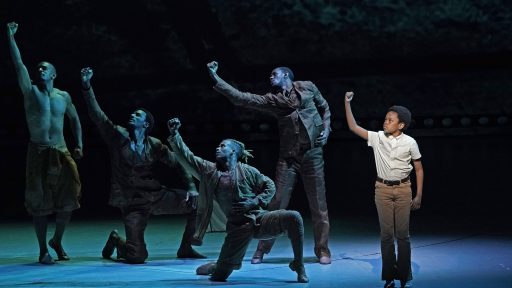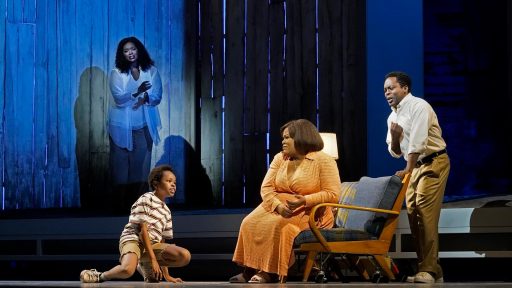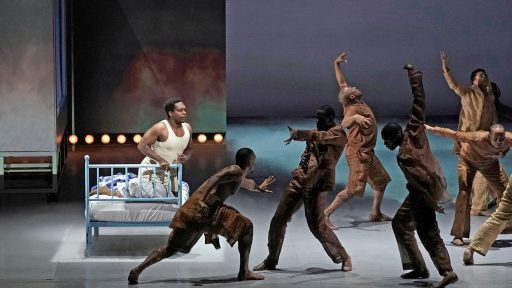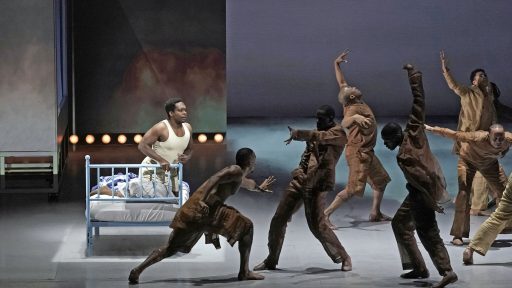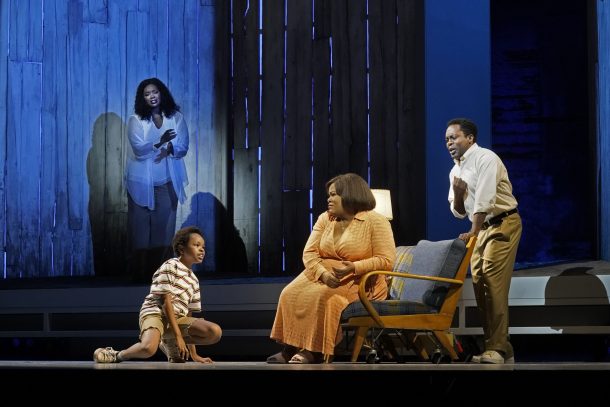
Angel Blue, Walter Russell III, Latonia Moore and Will Liverman in “Great Performances at the Met: Fire Shut Up in My Bones.” Photo by Ken Howard.
Season 16 of Great Performances at the Met continues with Great Performances at the Met: Fire Shut Up in My Bones, premiering Friday, April 1 at 9 p.m. ET on PBS (check local listings). The historic production marked the Met’s first performance of an opera by a Black composer, Grammy winner Terence Blanchard. Featuring a libretto by filmmaker Kasi Lemmons, the opera tells the story of a young man’s journey to overcome a life of trauma and hardship. James Robinson and Camille A. Brown co-direct this new staging, with Brown also choreographing, becoming the first Black director to create a mainstage Met production.
Baritone Will Liverman stars as Charles alongside soprano Angel Blue as Destiny/Loneliness/Greta with soprano Latonia Moore as Billie and Walter Russell III as Char’es-Baby. Audience members travel to 1970s and 1980s Louisiana, during Charles M. Blow’s childhood and early adult life.
Have you ever wondered what it’s like to write the text of a new opera production? The WNET Group’s Jasmine Wilson chatted with filmmaker and librettist Kasi Lemmons. Check out this special insider’s view to discover what it was like behind the scenes of this historic production.
*Responses have been edited for clarity.
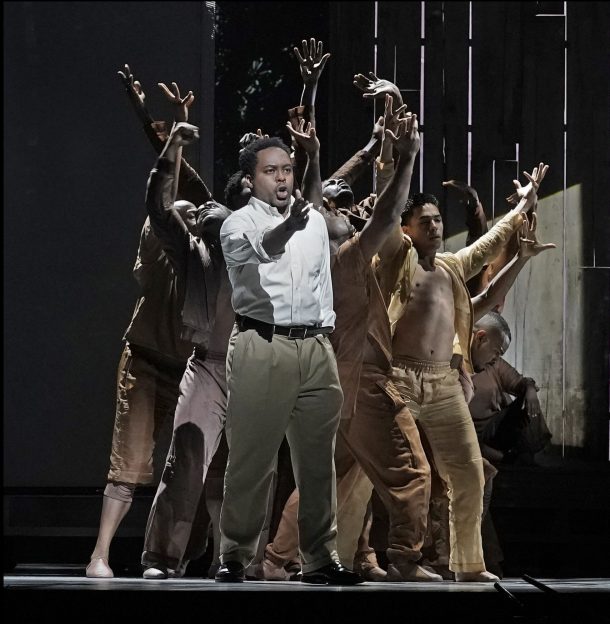
Will Liverman and dancers in “Great Performances at the Met: Fire Shut Up in My Bones.” Photo by Ken Howard.
- Jasmine Wilson: What drew you to Charles M. Blow’s story and to create the text for this opera?
Kasi Lemmons: What inspired me was a direct ask by Terence and his wife. I went to see a show because I’m a fan of Terence, and he’s like my brother. I mean, we’re close, and also his wife, we’re like family. I went backstage to see him, and Robin, his wife, was like, “So, Kasi, we want you to write the libretto for Terence’s next opera.”
Sometimes I feel like I know how to do the three things I know how to do. I was like, I don’t know how to write a libretto. Though, weirdly, it was kind of on my bucket list. And Robin was like, “Oh, you’ll be great,” and she handed me the book.
My first thought in reading Charles’ beautiful book is that it did not lend itself to structure. It was not apparent how that work would become an opera. So, I read it again. And in reading it again–besides just the story, which was wonderful and heartbreaking–the poetry in the prose began to inspire me. And I began to see these beautiful phrases and beautiful words that started my approach to the opera.
He has very, very, very evocative descriptions and a language that was very rooted in the culture and the place and time. The writing takes you to this place and this time and also is very expressive of things that can be very conceptual. It’s either very deep in character or things that are hard to put your finger on and explain, like what loneliness feels like or what it means to crave intimacy.
- JW: What was it like to venture into this new world of opera with Terence Blanchard?
KL: In the movies, he’ll see the film, he’ll read the script, and it might start there. He’ll start writing themes and music and then send it to me. Then I’ll either go, “Okay, this is mind-blowing, fantastic,” or “This one’s not quite working yet.” That’s our process, so I didn’t know what to expect from opera. I thought, oh, we’re going to work together, and I’m going to come to New Orleans. I love hanging with Terrence. And that was not at all what happened.
I wrote the libretto, and then he wrote the music. And I didn’t hear the music until an early workshop. I can’t even describe it. I was absolutely blown away, and the first thing I heard was. “Don’t be in such a rush to grow. When it’s time to make that jump, you’ll know.” It’s Billie’s first big aria, and it was just so beautiful.
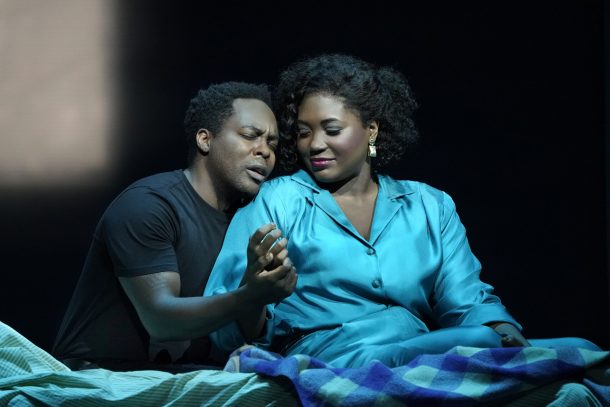
Will Liverman and Angel Blue in “Great Performances at the Met: Fire Shut Up in My Bones.” Photo courtesy of The Metropolitan Opera.
JW: Could you talk about how you developed the characters that we see and the relationships that play out?
KL: Well, I started with Charles. What I needed to know about him came from the second reading of the book and subsequent readings of it. He starts in this incredible rage, and so it’s a character that has a great deal of anger and hurt. But he’s also mama’s boy unabashedly. He has a big arc. When I’m writing, a protagonist becomes my true North. How do I best express Charles and how Charles is feeling?
But of course, I loved Billie, his mother. What an amazing woman that’s raised these five boys, these young men. And that brings Spinner, who’s also a great character. But it was Billie with her pistol in her bag. I was very moved by Billie and her determination and her strength and her fragility and her mistakes and her kind of bad taste in men. And then there was Spinner, who was just a lot of fun. He was smooth-talking, but I do think he loved her.
And from there, the brothers were really super important just to get the balance and that they loved each other. Charles craves intimacy, and they’re afraid of intimacy. We’re leading to a conversation about destiny and loneliness, which was a really liberating concept for me. I started thinking about if Charles’ destiny and his loneliness could sing. Once I had wrapped my head around that and gotten past my extreme embarrassment of writing a man’s loneliness as a character, I thought it was beautiful.
- JW: The portrayal of Black masculinity that we see in this opera isn’t something that is often allowed or that we usually get to see at all. Could you talk to me about that?
KL: Well, there are many different types of masculinity. Obviously, I was exploring toxic masculinity and a masculinity that might not be considered masculinity in a particular time and place by a certain group of people. I think it is that “peculiar graceful” masculinity.
And so it’s really all of those different forms of it and really trying to dive in. I made the decision, because it was in the book, to dive into fraternities–pledging and hazing and having brothers that didn’t want to talk about anything too deep.
I think it’s just so real. We know these people from families that just don’t say, “I love you” quickly, easily. Take a character like Charles, who just needs to be loved intensely. That’s all masculinity; it’s different forms of it to me. It’s all human nature. We sometimes rush into love. We sometimes pull back love. We sometimes hurt each other in terrible ways and expect ridiculous things from each other. And yet, to expect love is such a basic human thing. I was writing about men and women. But definitely, this opera was an exploration of the nuances and textures of masculinity.
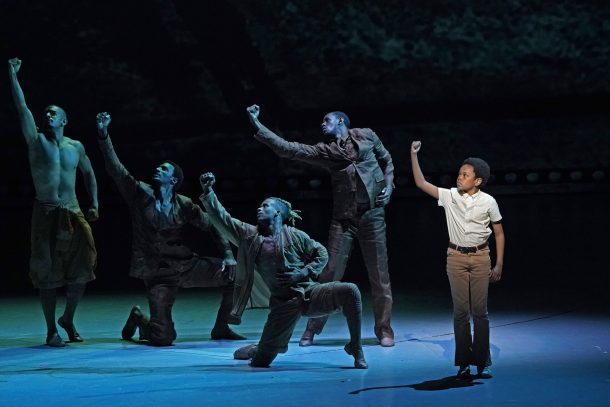
Walter Russell III and dancers in “Great Performances at the Met: Fire Shut Up in My Bones.” Photo courtesy of The Metropolitan Opera.
- JW: I noticed that there’s a lot of African American Vernacular English, specifically of this era. Can you tell me more about the choices you made and the specific kind of language used to portray 1970-80s Louisiana?
KL: I was inspired by the snatches of dialogue Charles included in the book, and how it sounded to him, and certain phrases. Like the old men that would say, “Yeah, he think he’s s*****g in high cotton,” or “Something wrong with that boy.”
Charles wrote it in a way that you could hear it. And I come from a very southern family. I just wanted to take an opera audience to Gibsland, Louisiana, at that period in time and really make it the way Charles heard them.
- JW: What do you hope audiences watching Fire Shut Up In My Bones will take away?
KL: It’s the same with movies, in a way. Sometimes things can be so specific they’re universal. Because you are with the protagonist and the antagonist and the characters, you realize that we’re all very human. We have hopes and dreams, and we love our families, and we try, and we fail, and all the things that make us human. I hope an audience relates to it.
“Billie reminds me of my grandmother,” or “I can relate to that kind of loneliness,” or “I can relate to being misunderstood or trying to get people to hear me.”
You’re always, to me, with art, trying to close the gap and remind people of our shared humanity, the things that make us similar.
- JW: What’s next for you?
KL: Well, I’m editing my next movie, which is going to come out this Christmas. And I’m working on a project with Sky Dance, which is an adaptation of a book that I love. It’s very Black, and it deals with racism but in a very interesting way. And it is very, very, very female-centric. It’s about a group of very tight-knit women and has elements of magic and fantasy. I’m just directing, writing, and open for adventures.
- JW: Is there anything else that you would like to share?
KL: I’m super excited to see it, and I hope that so many people get to experience it because it’s very, very special. And I’m really grateful that it’s being brought to a bigger audience this way.
To experience the full beauty of Fire Shut Up In My Bones, tune in to Great Performances at the Met on April 1 at 9 p.m. on PBS. Please be sure to check your local listings, as dates and times can vary widely across the country.

